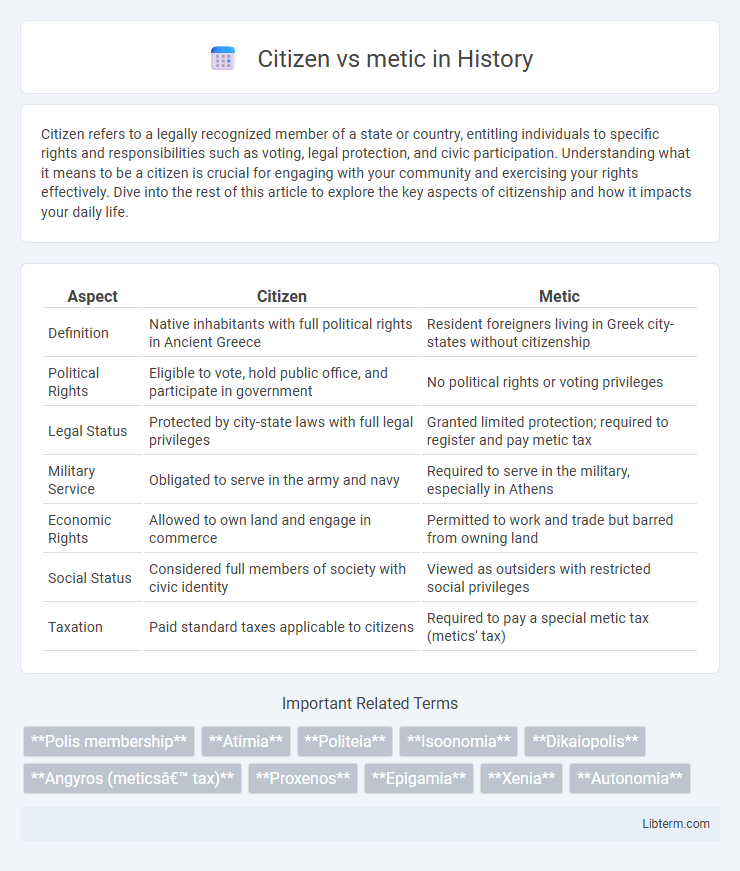Citizen refers to a legally recognized member of a state or country, entitling individuals to specific rights and responsibilities such as voting, legal protection, and civic participation. Understanding what it means to be a citizen is crucial for engaging with your community and exercising your rights effectively. Dive into the rest of this article to explore the key aspects of citizenship and how it impacts your daily life.
Table of Comparison
| Aspect | Citizen | Metic |
|---|---|---|
| Definition | Native inhabitants with full political rights in Ancient Greece | Resident foreigners living in Greek city-states without citizenship |
| Political Rights | Eligible to vote, hold public office, and participate in government | No political rights or voting privileges |
| Legal Status | Protected by city-state laws with full legal privileges | Granted limited protection; required to register and pay metic tax |
| Military Service | Obligated to serve in the army and navy | Required to serve in the military, especially in Athens |
| Economic Rights | Allowed to own land and engage in commerce | Permitted to work and trade but barred from owning land |
| Social Status | Considered full members of society with civic identity | Viewed as outsiders with restricted social privileges |
| Taxation | Paid standard taxes applicable to citizens | Required to pay a special metic tax (metics' tax) |
Understanding the Concepts: Citizen and Metic
A citizen in ancient Greece possessed full political rights, including voting and property ownership, signifying membership within the polis. In contrast, a metic was a non-citizen resident who contributed economically and socially but lacked political privileges and legal protections afforded to citizens. Understanding these distinctions clarifies social hierarchy and civic identity in classical Greek city-states.
Historical Origins of Citizenship
The historical origins of citizenship trace back to ancient Athens, where citizenship was a privileged status reserved for free-born males who participated in civic life, distinguishing them from metics, non-citizen residents with limited rights. Metics, often foreigners or immigrants, contributed economically but lacked political privileges, such as voting and property ownership. This distinction highlights early concepts of belonging, legal rights, and civic participation foundational to modern citizenship frameworks.
The Role of Metics in Ancient Societies
Metics in ancient Greek city-states, particularly Athens, played a crucial economic and cultural role despite lacking full citizenship rights. They were often skilled artisans, traders, and craftsmen who contributed to urban commerce and the economic vibrancy of the polis. Although metics could not vote or own land, their presence facilitated cultural exchange and innovation within these societies.
Legal Rights: Citizens vs. Metics
Citizens in ancient Athens possessed full legal rights, including the ability to vote, own property, and participate in government, while metics, as resident foreigners, were deprived of these privileges and subject to special taxes. Metics could engage in business and own personal property but lacked political voice and protections afforded to citizens, often requiring a citizen sponsor for legal matters. The distinction enforced a clear legal hierarchy, reinforcing citizens' political dominance and metics' limited integration despite their economic contributions.
Social Status and Privileges Compared
Citizens in ancient Greece enjoyed full political rights, property ownership, and legal protections, while metics, as resident foreigners, were excluded from voting and holding public office. Metics faced higher taxation and were required to have a citizen sponsor, limiting their social mobility despite their contributions to commerce and industry. Unlike citizens, metics could not participate in civic decision-making, reinforcing a clear social hierarchy based on legal status and privileges.
Civic Responsibilities and Participation
Citizens possess full civic responsibilities such as voting, jury service, and holding public office, ensuring active participation in democratic processes. Metics, as resident foreigners in ancient Greek city-states, were excluded from political rights and civic duties, limiting their involvement to economic and social contributions. The distinction underscores a legal and social boundary where citizenship confers active engagement in governance, while metics support the polis without direct political influence.
Pathways to Citizenship and Naturalization
Pathways to citizenship for citizens typically involve birthright or descent, while metics, often resident foreigners in ancient Greek city-states, lacked these automatic rights and relied on prolonged residence and sometimes military or civic contributions to gain limited privileges. Modern naturalization processes for non-citizen residents include residency requirements, language proficiency, and civic knowledge exams, reflecting structured pathways distinct from birthright citizenship. These processes highlight the legal and social distinctions between citizens and metics in both historical and contemporary frameworks of belonging and rights.
Economic Impact: Citizens and Metics
Citizens and metics played distinct roles in the economic structure of ancient Greek city-states, with citizens primarily engaging in land ownership, political roles, and benefiting from state resources. Metics, as resident foreigners, significantly contributed to commerce, craftsmanship, and trade, fueling urban economies but lacked political rights and land ownership. The economic impact of metics was critical in driving market activities and cultural exchange, complementing the land-based wealth and governance of citizens.
Famous Metics in History
Famous metics in history include Aristotle, who lived in Athens as a non-citizen contributing significantly to philosophy, and Aspasia, an influential companion of Pericles known for her intellectual salon. Metics were essential to Athenian society, engaging in commerce, crafts, and cultural activities despite lacking full citizen rights. Their roles highlight the complex social dynamics in ancient Greece between citizens and resident foreigners.
Modern Parallels: Citizenship and Residency Today
Modern citizenship and residency reflect ancient distinctions between citizens and metics, where citizenship grants full political rights and residency offers limited privileges. Today, citizens enjoy voting rights, access to social services, and legal protections, whereas residents may work and live in a country but lack political participation and specific benefits. This dynamic mirrors classical Athens, emphasizing ongoing debates about integration, rights, and identity in contemporary immigration policies.
Citizen Infographic

 libterm.com
libterm.com